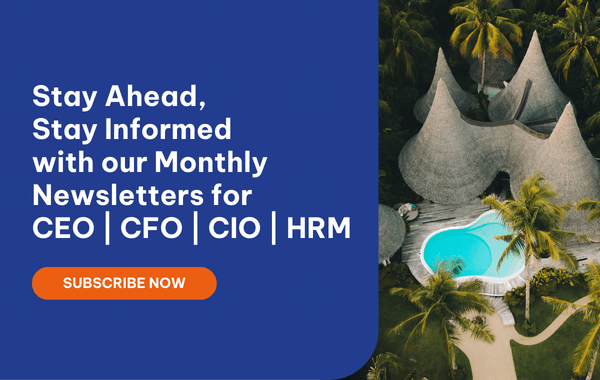Modern travellers expect a seamless journey, from destination research to hotel booking, flight confirmation, and local hangout suggestions, up until when they reach their homes. However, the hospitality industry has been slow in adopting new technologies. Hotel solutions are neither intuitive nor capable of making full use of the abundant customer data. Will the hospitality industry continue relying on Online Travel Agencies (OTAs) to bring in more revenue? Or there will be service providers confident enough to take on the challenges that hotels present?

The under-developed hotel management solutions can’t support guest’s booking experience
When it comes to an IT solution for the hospitality industry, particularly one that can connect every single function to help the business to serve the ultimate goal, being hospitable, there is not a single player that stands out like Salesforce’s CRM or SAP’s, Oracle’s, and Infor’s ERP solutions.
The hospitality industry has been using on-premise, in-house systems for years. When the world has evolved and software service providers have been offering cloud-based solutions to suit both individuals and businesses' needs, the hospitality technology focuses on optimising transactions instead of focusing on optimising user experience.
During the past few years, the technology landscape for the hospitality industry has seen some progress with new cloud-based initiatives. However, these are either simply bolted on or replacing the outdated functions instead of creating one cohesive, intuitive platform that allows cross-function collaboration and empowering the best possible user experience.
Hoteliers need to transform not only the booking experience but the entire guest journey in order to earn the guest's loyalty, create a competitive advantage, and optimise revenue.
Read more: Key Concepts in Revenue Management: Relevant Data and Intelligent Pricing
The age-old problem: data integration
Hotels need to manage pricing, distribution, payment security, data security, rooms and non-room services, and many more. Furthermore, each function within the hotel uses different systems, thus, they all possess different sets of data.
Reservations are stored in PMS, guest spending is collected by the F&B separate POS systems, guest data is managed by a CRM system and is sometimes utilised by a third-party analytics service. Pricing, forecasting and reporting are conducted via a different revenue management solution as the back office has a very different demand and scope of work from the front office staff.
The highly fragmented and outrageous amount of data make integration a critical and urgent task. This puts the software service providers in a tight spot designing one holistic solution with interoperability.
Read more: 7 Steps to Take Your Revenue Management to the Next Level
From the guest’s perspective
The mobile technology
It's been a well-known secret that mobile technology is the key element that drives innovation and profitability in the travel sector. It can be said that using mobile to search for hotels and airfares is becoming as popular as browsing for clothes.
The 2016 Expedia/Egencia Mobile Index reported that 60% of the respondents are unwilling to travel without their mobiles. 63% put their phones next to their beds while sleeping, and 28% also carry a portable charger to charge their phones on the go.
What hotels have been doing to ensure undisturbed interactions with the customers is to install chatbots in Viber, WhatsApp, or in hotel’s app. However, the adoption is also slow and scarce as it takes a bit of time and plenty of data to properly build a “smart” chatbot. And not every hotel has the resources to implement chatbot or build one on their own.
Guest’s booking via OTAs vs. metasearch
When it comes to online booking, a large number of travellers book through OTAs (Booking.com, Agoda, Expedia, etc.) or other sharing economy platforms like Airbnb. These service providers are dominating the market due to them being perfectly optimised online. The conversion rates via OTAs currently are two times higher than hotel websites’.
Amidst the booking war, metasearch is the other player that can retaliate. Metasearch wins the favour of many travellers due to its transparency when displaying hotels’ information. It also displays a “brand.com” booking link which ultimately increases the number of direct bookings for hotels.
Nevertheless, metasearch is still a form of advertising. The true return on metasearch also does not take effect immediately. Having said that, this approach encourages your potential clients to book directly with your brand instead of having them look for other options.
With appropriate pricing strategy (competitive with OTAs’ rates), added bonuses that guarantee to boost guest experience, and a streamlined, user-friendly booking engine to keep your guests stay on your site, in the long-run, metasearch can be a worthy investment that hoteliers and revenue manager should really consider.
Read more: 3 Strategies to Drive Direct Bookings that Don't Violate OTA Rate Parity
In conclusion
It takes more than just a clean, fully furnished room to satisfy each of your guests. Modern travellers nowadays expect the “Amazon” level of personalisation to satisfy their thirst for experiencing "something on their own."
It takes just several visits to acquire the data needed to build a specific customer profile: he/she is on a business trip (or a romantic trip, or a trip to self-discovery). He/She likes soda water, dislikes the fruit bowl, and favours local eatery or nature than tourist hotspots, etc.
Guests should be recognised everywhere they go. Very few hotels invested in technologies that allow them to engage with the customers beyond the reception counter. By utilising the right technology, the right tool, hoteliers will be able to tailor and enhance the travel experience for each guest.
If your hotel does not offer your guests with the ability to explore your own property, book tours, or even a sneak peek into the local attractions, you are at risk on losing your loyal customers to the competitors in the market.
 English
English  Vietnamese
Vietnamese 

